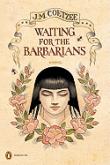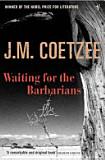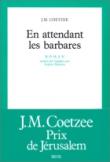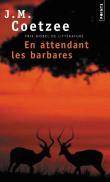AustLit
Latest Issues
AbstractHistoryArchive Description
After twenty years of peacefully running one of the Empire’s settlements, a magistrate takes pity on an enemy barbarian who has been tortured. He enters into an awkward intimate relationship with her, and then is himself imprisoned as an enemy of the state.
Waiting for the Barbarians is a disturbing political fable about oppression, the fraught desire for reparation, and about living with a troubled conscience under an unjust regime.'
Source: Publisher's blurb.
Adaptations
-
Waiting for the Barbarians
2014
single work
screenplay
— Appears in: Two Screenplays 2014;
Notes
-
Dedication:
For
Nicolas and Gisela
-
Editions and translations have been updated for Waiting for the Barbarians by Eilish Copelin as part of a Semester 2, 2013 scholar's internship.
Given the international popularity of Coetzee's work, however, this record is not yet comprehensive. Due to the enormous breadth of critical material on Coetzee's work, indexing of secondary sources is also not complete.
Publication Details of Only Known VersionEarliest 2 Known Versions of
Other Formats
- Braille.
- Sound recording.
Works about this Work
-
Waiting for the Barbarians
2023
single work
criticism
— Appears in: The Bloomsbury Handbook to J. M. Coetzee 2023; (p. 91-102) -
World Literature, the Opaque Archive, and the Untranslatable: J. M. Coetzee and Some Others
2023
single work
criticism
— Appears in: The Journal of Commonwealth Literature , June vol. 58 no. 2 2023; (p. 480–497)'A key concern of recent theoretical orientations in the development of “World Literature” as a discipline has been the question of accessibility to literatures in minor languages, which is to say of literal and metaphorical translatability, even transparency. This essay explores the challenge posed by the occlusion of the possible intertextual influence of works in such languages that are evident only as a trace in texts that now seem indisputably part of a canon of World Literature. What happens when the engagement of writers in this canon with cultural production in languages adjacent to those in which they themselves principally operate is not evident to an increasingly global community of scholars, and perhaps not even evidenced in an author’s archive (whether this is understood to be a material collection or indeed a virtual space conceptualized as the literary ecosystem in which an author has developed)? This essay addresses these questions with reference to the work of South African-born Nobel Prize-winning writer J. M. Coetzee, and to the problem posed by some of his work’s (and his archive’s) others, here specifically Afrikaners and the work of Afrikaans-language writers. This consideration has implications not only for the current shape of Coetzee studies, but for that of World Literature more broadly, presenting something of a limit-case for the translation metaphor that directs some of its formulations as disciplinary field.' (Publication abstract)
-
Dismantling Colonial Frontiers : The Partnership Word in Coetzee’s Waiting for the Barbarians
2022
single work
criticism
— Appears in: Ecosustainable Narratives and Partnership Relationships in World Literatures in English 2022; (p. 112-125) -
Unformed Agency and Narrative Resistance in J. M. Coetzee’s Waiting for the Barbarians
2022
single work
criticism
— Appears in: Ariel : A Review of International English Literature , July vol. 53 no. 3 2022; (p. 149-173)'This essay draws on theories of the unconscious and trauma to examine the representation of the barbarian girl in J. M. Coetzee’s Waiting for the Barbarians. While scholars have claimed that the Magistrate’s narrative production and interpretative method act as a form of resistance to the Empire, I offer that the barbarian girl creates models of resistance against imperial oppression in which she becomes the producer of meaning. In my reading of the novel, I foreground the ways in which the barbarian girl escapes and eludes the Magistrate’s attempt to foreclose her narrative within the history of the Empire. In doing so, Coetzee’s text presents the barbarian girl as the basis for an emergent, ethical future, a temporal disruption of Empire, such that her narrative creates the conditions for social change. Rather than Coetzee’s claim that South African literature functions in bondage, Waiting for the Barbarians offers the battleground of the psyche as the space of potential liberation from which a poetics of futurity emerges.' (Publication abstract)
-
《等待野蛮人》:一部人类纪环境警示录)
2019
single work
criticism
— Appears in: Contemporary Foreign Literature , vol. [2019] no. 4 2019; (p. 119-126) In approaching J. M. Coetzee’s Waiting for the Barbarians, critics have tended to focus on torture and its rich political and ethical connotations, with insufficient attention paid to its environmental concerns. In fact, in the novel, Coetzee not only describes the harsh environment and climate, but also explores the conflicts between human beings and the environment through the imperial army’s strange defeat in the war against its imaginary "barbarian" enemy. Waiting for the Barbarians is therefore an environmental warning for the Anthropocene. One feasible way out of this predicament is the Confucian ecological philosophy, which aims at realizing the harmony between man and nature, emphasizes the solidarity between them, and advocates that human beings, as subjects of virtue, should consciously improve their moral cultivation, respect nature and treat all forms of life with benevolence. (Source: publisher's abstract).
-
Hunting Animals in JM Coetzee's Dusklands and Waiting for the Barbarians
2013
single work
criticism
— Appears in: Social Alternatives , vol. 32 no. 4 2013; (p. 15-20)‘J.M. Coetzee’s early novels Dusklands (1974) and Waiting for the Barbarians (1980) outline the Western imperialist project to colonise and subjugate ‘other’ people, animals and the environment. The masculine colonising subject (in Cartesian terms, res inextensa) has separated itself from the world (res extensa) and seeks to conquer and subjugate in order to subsume it. Dusklands comprises two narratives: one, that of Jacobus Coetzee who hunts human and nonhuman animals and leaves a destructive trail behind him as he blazes a frontier in 1800s South Africa; and two, Eugene Dawn, an American mythographer, who advocates his ‘Vietnam Project’ to win the US war in Vietnam in the early 1970s by defoliating the environment and hunting the Vietcong ‘like animals’. In Waiting for the Barbarians, Colonel Joll deals with the Barbarian ‘threat’ to his Empire by similarly destroying the environment, hunting barbarians, and torturing woman and children. Each character is locked into a Cartesian ‘self’ consciousness that cannot interact with the ‘other’ (female, nonhuman animal, ‘indigenous’) except through violence and destruction. Hunting is a manifestation of this disease and the protagonists make no distinction between human, animal or vegetable in their path of destruction in the name of colonial expansion.' (Publication abstract)
-
The Gate Deferred : J.M. Coetzee and the Battle Against Doubt
2013
single work
criticism
— Appears in: Southerly , vol. 73 no. 3 2013; (p. 90-111) 'Esposito writes of Coetzee's characters (it is not Elizabeth Costello alone) in effect morally naked at the Gate, awaiting admission after - or so they think - the passing of a last judgement, but what is it that is expected of them, and what is this a gate to? (David Brooks, 'Editorial' p. 6) -
Teaching Coetzee’s Subject : Waiting for the Barbarians and Disgrace
2014
single work
criticism
— Appears in: Approaches to Teaching Coetzee's Disgrace and Other Works 2014; (p. 59-66) -
Open to Interpretation : Politics and Allegory in Coetzee’s Waiting for the Barbarians
2014
single work
criticism
— Appears in: Approaches to Teaching Coetzee's Disgrace and Other Works 2014; (p. 146-151) -
Sven Hedin's “Vanished Country” : Setting and History in J.M. Coetzee's Waiting for the Barbarians,
2015
single work
criticism
— Appears in: Scrutiny2 , vol. 20 no. 1 2015; (p. 103-127) 'Since J.M. Coetzee’s manuscripts, notebooks and miscellaneous other archival materials have become available for study at the Harry Ransom Centre (HRC) in Texas in 2013, it has become possible to shed new light on one of the more enigmatic aspects of Coetzee’s early fictions, namely the origins of the setting and landscape of Waiting for the barbarians. With his previous two novels, Dusklands (1974) and In the heart of the country (1977), Coetzee had established himself as a significant avant-garde South African writer, but the next novel, Barbarians (1980), on the face of it, seemed to veer off-course as an engagement with the historical trauma of his country. When the book was published, readers and critics found Coetzee’s choice of a richly detailed yet seemingly invented non-South African setting both attractive and puzzling. Irvin Howe wrote in the New York times that the novel’s landscape was an “unspecified place and time, yet recognizable as a ‘universalised’ version of South Africa”, and Bernard Levin, in an influential London Sunday times review, thought that the story appeared to indict the repressive South African political situation, “[b] ut that beneath the surface it is timeless, spaceless, nameless and universal” (1980: n.p.). A reviewer in Newsweek thought that Coetzee’s “terrain is African” but that “subtle dislocations in time and geography, however, make it clear that his political parable is set in a mythical realm” (Clemons 1980: 55). Peter Lewis (1980: 1270) also recognized allusions to South Africa, but concluded that “the place cannot be located on any map”. In many critical responses there was a tension between a desire to read the novel as a South African narrative, and a simultaneous recognition of the story’s non-specific emplacement which transcended the political oppression of late apartheid. It was precisely the text’s sense of geographical and historical dislocatedness that made it a compelling reading experience, as for example articulated by Peter Wilhelm: “The strange landscapes, part-African, part a country of the mind; the sense of action and thought scarcely disturbing the flux of time; the crystalline lucidity of the language – these will haunt the reader long after the novel has been set aside” (cited in Kannemeyer 2012: 345). ' (Author's introduction)
Awards
- 1981 winner Geoffrey Faber Memorial Prize
- 1980 winner Central News Agency Literary Award (CNA Literary Award)
- 1980 winner James Tait Black Memorial Prize
-
cSouth Africa,cSouthern Africa, Africa,















